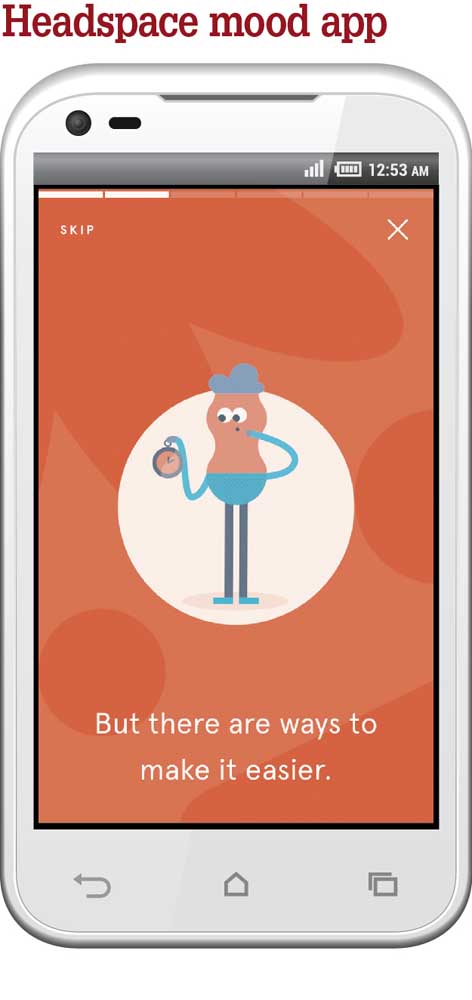Find your h-app-y place with these mood apps
Published 12:00 am Friday, February 22, 2019

- Find your h-app-y place with these mood apps
Bliss be damned. Right off, the calmness app and I were embroiled in a digital disagreement, which isn’t the best way to start down the path of self-help harmony.
In order to successfully download Pacifica, the first of four apps I was trying out in order to better manage my mood, I needed to remember the password for my phone, which was neither top of mind nor on any of the yellow post-it notes tacked to my computer.
An app that would make me a calmer person seemed folly, but worth a try, given a recent history of high blood pressure and my general lack of patience for fools, technology and my inability to remember things like passwords.
There’s no shortage of self-help apps to choose from. A simple online search can get you started with numerous Top 10 lists. In truth, it’s an overwhelming selection and your best bet is to probably just pick one, any one, and see if it works for you. You can always delete it later if it doesn’t.
Most of them offer free trials and because they’re on your phone, you can use them anywhere — at home, in your car, on a park bench, wherever you find yourself enjoying a few moments away from the world.
I had read that the claims made by many of these apps have not been reviewed by mental health experts, but were seen as an innovative approach to soothing the mind. What did I have to lose?
My mood definitely improved when I remembered my password and the app was installed. I set up the account and immediately received a tailored response: Welcome Crankydad!
Pacifica
Rated one of the top apps to help manage stress, anxiety and depression, Pacifica was developed in 2014 in San Francisco. Like all of the apps I tried, it believes in daily tools to break the cycle of negative thoughts you may have, so you program reminders, which come via email and phone alerts.
The trick is to pay attention to them, which can be difficult if you are busy.
In the beginning, it asked me to set a goal: “Decrease anxiety? Feel happier? Find hope?”
After telling the app my mood by tracing a finger around a circle — from Great to Awful — I chose a meditation exercise. This came with a background soundtrack of lapping waves, which to be honest, only reminded me that I was 2,500 miles away from my favorite surf break.
I was supposed to close my eyes and feel the air, but instead, I closed my eyes and thought of catching a blue head-high wave.
That might not have been what Pacifica had in mind, but I couldn’t argue with the fact that it cleared my mind of negative thoughts.
Headspace
Founded in London in 2010 by a Buddhist monk and a marketing expert, which probably sounds like the start of a bar joke, Headspace wants you to “meditate and live mindfully.”
It’s whole focus is to teach you how to meditate and gives you simple, positive prompts to guide you toward your own inner enlightenment.
Each meditation session is explained by a soothing British man who explains that it’s OK for your mind to wander when you try to clear your thoughts. For some reason, I kept thinking of Jeremy Irons or Alan Rickman telling me to relax.
Meditation is about changing your relationship with your feelings. You’re supposed to envision yourself sitting along a road, watching the traffic but not swept up by it. The volume of traffic doesn’t matter but how you relate to it does.
It seemed to work, at least for me. But if meditation sounds loopy, as if unicorns should be bounding through the traffic, consider this: Forbes magazine estimates that Headspace is worth about $250 million.
MoodPanda
OK, I confess: I chose the MoodPanda app strictly because of the name. Come on, who doesn’t find pandas calming?
MoodPanda will allow you to create a mood diary, which is like most of the self-help programs, but the part I found intriguing was the digital community you could tap into.
MoodPanda claims to have a community of more than 100,000 so-called “lovely people” you can chat with via the app’s Life World feed. The app’s creators say people in their digital community want a place where feelings can be shared with like-minded people — all strangers, of course — who won’t judge them. It’s all anonymous. Everyone has the same avatar — a panda.
But MoodPanda requires a bit of patience to use. Many applications failed to work the first and often the second time I tried to use them.
If you can get past that, your mood might improve. For me, I needed to delete it first.
Youper
The draw for the Youper app is the artificial intelligence that greets you when you sign up.
“Hi! I’m Youper, your personal assistant to help you feel your best,” it says in the first of a stream of messages that are not unlike texts from your best friend. The message comes with the stamp of approval of our times: A smiley-face emoticon.
That’s no surprise, really. Youper’s creators — a psychiatrist, a software engineer and a designer — view their digital assistant as a “first-responder” for your problems.
“How are you?” it asks.
It’s snowing and I have to shovel the driveway.
“You know, scientists say the key to happiness is pausing to recognize happy moments in your life,” it says.
Well, Mrs. G. made my breakfast and it’s very tasty. I’m pretty lucky. Already, I feel better. Youper and I agree that being more optimistic is a worthwhile goal. It wants me to think of it as Alfred to Bruce Wayne, C-3PO to Princess Leia.
Not so bad, I figure. Everyone can use a sidekick, even if it’s a problem solving algorithm from your phone.






